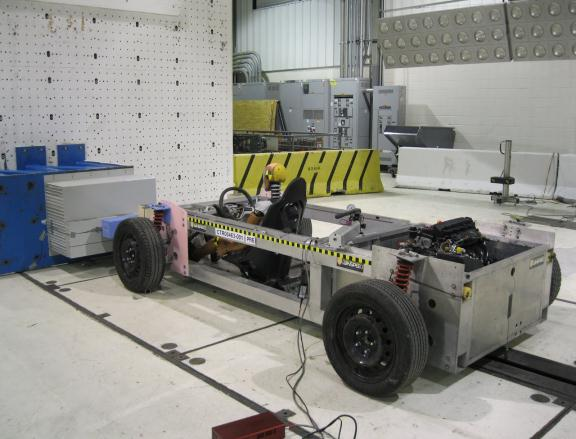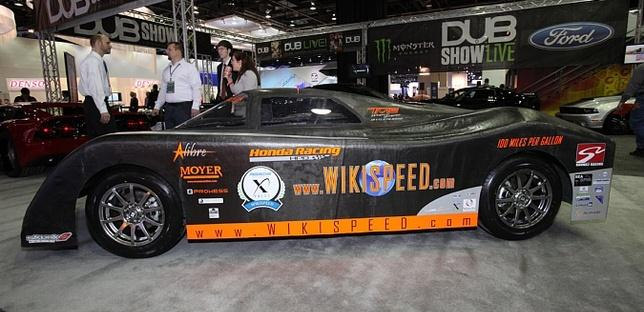Ways of Working115
Applying Agile software principles and practices for fast automotive development
Evan Leybourn
March 16, 2019
Evan Leybourn
March 16, 2019
WIKISPEED: The WIKISPEED SGT01 car was an entrant in the Progressive Insurance Automotive X Prize contest, to produce a full-sized, road-legal car, getting 100+ mi/gal (2.25L/100 km). Agile methods were introduced, to give product cycle times measured in weeks, not years.
This case study was originally published in "Directing the Agile Organisation" by Evan Leybourn
This case study describes how a distributed, collaborative team of volunteers, spread around the world, is creating, on a shoestring budget, a model for how to design and manufacture a highly efficient automobile. WIKISPEED is doing this by borrowing, and evolving, concepts from a variety of sources, such as Agile and lean software development, and continuing to evolve them in order to fit the context of automobile research, design and production. In particular, WIKISPEED is adapting aspects of Agile software development principles and practices to the research, design and production of physical products.
Borrowing processes from Extreme Programming and Scrum, WIKISPEED has created a research, design and production cycle, in which changes can be made to any part of the automobile, every week. These Agile principles and practices have resulted in several innovations, including:
Good Agile design demands modules that are loosely coupled, and can be tested apart from the entire system. These principles have led to a modular automotive design. On the WIKISPEED car, major sub-assemblies, such as suspension, motor, and body, can be replaced in the time it takes to change a flat tyre. The wheels and suspension bolt to the chassis, and can be repositioned or replaced. The composite body bolts to the chassis (Figure 16), and allows exchange of external shells.
 The same car can be a race car today, and a pick-up truck tomorrow. This modularity supports many of our design and process principles. It allows for rapid Iterations and experimentations during development and testing. Loosely coupled components, with simple and well-defined interfaces, minimise system interdependencies, enabling more rapid and reliable software and hardware development. Modularity allows unit tests of individual systems, and supports concurrent engineering and experimentation. It leads to more innovation, which contributes to low design costs, low manufacturing cost, more long-term evolution, and more consumer post-sale options.
The same car can be a race car today, and a pick-up truck tomorrow. This modularity supports many of our design and process principles. It allows for rapid Iterations and experimentations during development and testing. Loosely coupled components, with simple and well-defined interfaces, minimise system interdependencies, enabling more rapid and reliable software and hardware development. Modularity allows unit tests of individual systems, and supports concurrent engineering and experimentation. It leads to more innovation, which contributes to low design costs, low manufacturing cost, more long-term evolution, and more consumer post-sale options.
To minimise weight, we wanted to use a structural carbon fibre body; however, the lowest bid of $36,000 over three months (with waived labour costs) was beyond our budget, especially when factoring in changes during each Iteration. To overcome this, Robert Mohrbacher (one of our team members) pioneered a composites process that takes considerably less time and money to go from a CAD drawing to a full, structural carbon fibre body. This process now only requires $800 for materials, and only takes three days; these significant savings in capital and time allow us to more quickly experiment and adapt.
Based upon over two years of WIKISPEED experience, we summarise what has been important to date, and what might be applicable to other projects. The following were critical to the WIKISPEED project:

The term ‘Extreme Programming’ was coined because the authors of that process combined 13 good practices, to reap a synergistic result. The set of practices described in this paper may be the beginning of a similar set that could be called ‘Extreme Manufacturing’.
WIKISPEED is pioneering a qualitatively different approach to the research, design and production of automobiles. It has long been known that the Waterfall Method does not work well with software, where requirements are unknowable and subject to rapid change. Lean product design and manufacturing both take a much more iterative approach to this work for physical products.
WIKISPEED is trying to push this even further, largely by applying software design principles and practices to automotive engineering. Our experience indicates that this can dramatically speed up the automotive development time, reduce the need for expensive tooling, and potentially lead to a qualitatively different business model.
- David Socha, University of Washington Bothell
- Tyler C Folsom, QUEST Integrated Inc.
- Joe Justice, Team WIKISPEED
WIKISPEED is a volunteer based green automotive-prototyping company, with a goal to change the world for the better. We’re a collaborative team of skilled individuals who volunteer time to design and build safe, low-cost, ultra-efficient, road-legal vehicles. We’re passionately committed to rapidly solving problems for social good.
Authors for the WIKISPEED papers are;
Dr David Socha; an Assistant Professor in the Computing and Software Systems Program at the University of Washington, Bothell. His research and teaching interests focus on how professional software developers collaborate and design complex software systems, and the design of tools, principles and practices to enable effective software development.
Dr Tyler Folsom; a professional engineer with 30 years of experience. He has published over 40 papers and technical reports. Dr Folsom is a project manager with Qi2, specialising in robotics and machine vision. His current interest is enabling the transition to sustainable transportation based on automated vehicles.
Joe Justice; the CEO of WIKISPEED, leading a global, volunteer network of individuals’ intent on bringing a 100mpg (2.25L/100km) car to market, while transforming automotive production. Joe is also a principle consultant at Scrum Inc and creator of the eXtreme Manufacturing methodology.
Please subscribe and become a member to access the entire Business Agility Library without restriction.